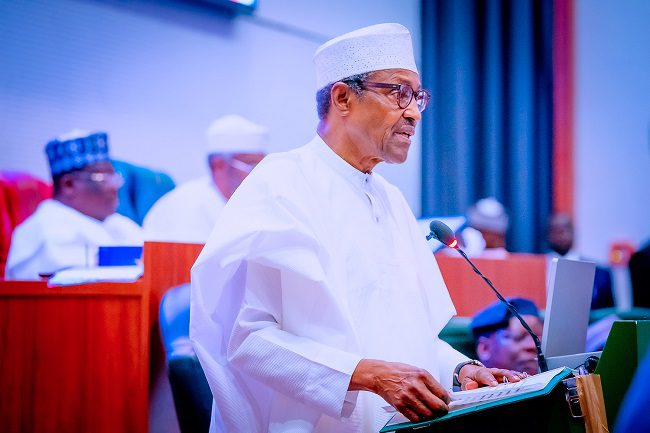President Muhammadu Buhari has presented the 2023 budget proposal of N20.51 trillion (about $47.697 billion) before the joint session of the National Assembly.
Delivering his budget speech on Friday in Abuja, President Buhari explained that the 8th financial blueprint, which is the last under his administration, is tagged the “budget of Fiscal Sustainability and transition” and that that is it was designed to address critical issues and lay a solid foundation for the incoming administration.
According to the Nigerian leader, the budget is based the fiscal assumptions and parameters that total federally-collectible revenue is estimated at
N16.87 trillion N in 2023, while the total federally distributable revenue is estimated at N11.09 trillion in 2023 and the total revenue available to fund the 2023 Federal Budget is estimated at N9.73 trillion.
He stated that oil revenue is projected at N1.92 trillion, while Non-oil taxes are estimated at N2.43 trillion and independent revenues are projected to be N2.21 trillion.
According to him, the principal objective in 2023 is to maintain fiscal viability and ensure smooth transition to the incoming Administration. Therefore the 2023 to 2025 Medium Term Expenditure Framework and Fiscal Strategy Paper sets out the parameters for the 2023 Budget with oil price benchmark put at $70 per barrel; daily oil production estimate of 1.69 million barrels (inclusive of Condensates of 300,000 to 400,000 barrels per day) and the exchange rate of N435.57 per US Dollar; and the projected GDP growth rate of 3.75 percent and 17.16 percent inflation rate.
On revenue estimates, he explained that the budget is based on these fiscal assumptions and parameters, total federally-collectible revenue is estimated at N16.87 trillion in 2023, while total federally distributable revenue is estimated at N11.09 trillion in 2023 and the total revenue available to fund the 2023 Federal Budget is estimated at N9.73 trillion 44.
On expenditure he disclosed that Capital Expenditure of N5.35 trillion, including the capital component of Statutory Transfers; Debt Service of N6.31 trillion; and Sinking Fund of N247.73 billion to retire certain maturing bonds.
He noted that the government expects a total deficit of N10.78 trillion, which represents 4.78 percent of estimated GDP, above the 3 percent threshold set by the Fiscal Responsibility Act 2007.
Buhari disclosed that the government plans to finance the deficit mainly by new borrowings totalling N8.80 trillion, N206.18 billion from privatization proceeds and N1.77 trillion drawdowns on bilateral and multilateral loans secured for specific development projects and programmes.
Speaking on some of the achievements of the government, Buhari said: “We have made transformational investments in Infrastructure, notably: establishing the Infrastructure Corporation of Nigeria (‘InfraCorp’), in 2021, seed capital of N1 trillion from the Central Bank of Nigeria (‘CBN’), the Nigeria Sovereign Investment Authority (‘NSIA’) and the Africa Finance Corporation (‘AFC’);
“Leveraging finance through the NSIA into the Presidential Infrastructure Development Fund (‘PIDF’) to facilitate the accelerated completion of the Second Niger Bridge, Lagos-Ibadan Expressway and Abuja-Kano Road;
“Through the Road Infrastructure Tax Credit Scheme pursuant to Executive Order #7 of 2019, incentivised responsible companies to invest billions of Naira in constructing over 1,500km critical roads in key economic corridors. Under this Scheme, the Dangote Group has substantially completed the Reconstruction of 34km Apapa-Oworonshoki-Ojota Expressway and the 43km Obajana-Kabba Road. Similarly, Nigeria LNG Limited is on track to complete the 38km Bodo-Bonny Road and Bridges Project by the end of 2023.”
Other investments, according to him, include “restoring our national railways, completing and commissioning the 156km Lagos-Ibadan Standard Gauge Rail (and its 8.72km extension to Lagos Port); the 186km Abuja-Kaduna Standard Gauge Rail; and 327km Itakpe-Warri Standard Gauge Rail. These completed projects complement our ongoing investments in Light Rail, Narrow and Standard Gauge Rail, Ancillary Facilities Yards, Wagon Assembly Plants, E-Ticketing infrastructure as well as the training and development of our rail engineers and other workers;
“We have completed New Airport Terminals at Lagos, Abuja, Kano and Port Harcourt, and reconstructed the Abuja Airport Runway in its first overhaul since its construction in the early 1980s.”
He, however, disclosed that the 2023 Budget was prepared amidst a very challenging world economy that is weakened by the lingering effects of the COVID-19 pandemic, high inflation, high crude oil prices resulting in huge cost of PMS Subsidy and negative spillover effects of the Russia-Ukraine war.
Buhari stated that many economies around the world are currently contending with fiscal instability, slow growth, food crisis, and high interest rates and that like many other countries, “our economy faces headwinds from low revenues, high inflation, exchange rate depreciation and insecurity”.
He disclosed that Nigeria’s real Gross Domestic Product grew by 3.54 percent in the second quarter of 2022, marking the seventh consecutive quarter of growth. “Our interventionist and reflationary measures have been very effective and impactful. We must however continue to work towards achieving much higher levels of growth, especially given our high population growth rate, so that the average Nigerian can truly feel the impact of planned economic growth,” he said.
The Nigerian leader lamented that despite continuing efforts, unemployment, underemployment, and poverty rates remain high. We are currently implementing several skills development programmes and work opportunity programmes to enhance the employability of our youths and tackle the troubling level of youth unemployment.
“While it is evident that our economy still faces significant challenges, what could have happened without the implementation of some of the measure we introduced, would have been much worse for the country,” he added.
GIK/APA


